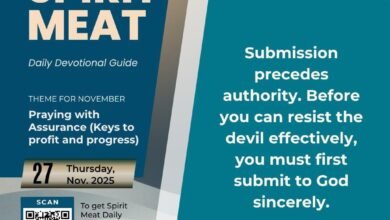
We have a lot of lessons to learn from the life of Moses as a great intercessor. Moses was a man that would stand in the gap until the purpose of God was accomplished. God told Moses that His will concerning the nation of Israel was to carry them to the Promised Land, a land flowing with milk and honey. However, they angered God severally and God said, “I will wipe them out.” Then Moses interceded and said, “No, Your will must stand, oh Lord!”
God is looking for someone to remind Him of His will and cause a release of His power in this generation because He has already said He did not want the death of sinners but that they should repent and turn to Him (Eze. 33:11).
Moses was a man that was not concerned for himself but for the purpose of God. He was more interested in the counsel and will of God coming to pass than His gain or comfort. The person that God will use to birth His glory at this end-time must be dead to self. God said to Moses, “Let Me destroy these people. I will disinherit them and I will raise another nation out of you.” If Moses was a man filled with self or one who was self-centred, he would have said, “Yes, Lord. I have been observing them and saw that they are so stubborn and cannot make it. Kill them and raise out of me a nation.” But Moses said, “No Lord! Your will must stand.”
PRAYER: Help me, Lord, to place Your will above my interest in the name of Jesus. Amen!
BIBLE IN A YEAR: Ezekiel 29:1-30:26; Hebrews 11:32-12:13; Psalm 112:1-10; Proverbs 27:17
———————————————————— www.lifeoasisinternationalchurch.org www.soundcloud.com/reverendareogun www.dciradio.org YouTube Channel- Sola Areogun Ministries +2348037252124 #SpiritMeat #ReverendAreogun ———————————————————— Copyright ©️ 2022 The general public is hereby informed that exclusive copyright subsists in this work and therefore any attempt to reproduce, copy, distribute to public for commercial purposes, publish any translation of the work, make any film in respect of the work, make an adaptation of the work, either the whole or substantial part of the work, either in its original form or in any form recognisably derived from the original is an infringement on the right of the author and subject to litigation unless and except the author has officially and clearly authorised the said person or persons or the author is clearly acknowledged in the work.




